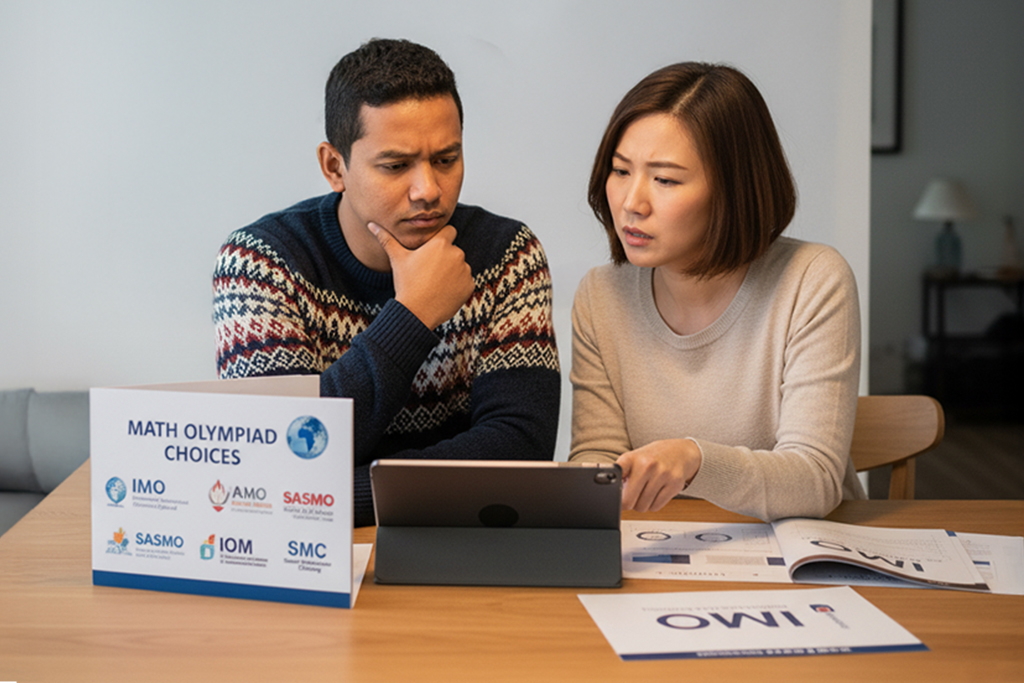As parents, we’ve all been there:
 Math Olympiads can broadly be divided into two categories:
Math Olympiads can broadly be divided into two categories:
- “Yes, my child is doing the Math Olympiad.” But when asked which one? “Not sure.”
- “My child scored very well in XYZ Olympiad.” That’s amazing! But what’s next? “We don’t know.”
- “Our school conducts only one Olympiad, so that’s what we do.”
 Math Olympiads can broadly be divided into two categories:
Math Olympiads can broadly be divided into two categories:
- Curriculum-aligned Olympiads (like IMO, IOM, UIMO) help students master grade-level concepts.
- Higher-Order Thinking Olympiads (like AMO, SASMO, SMC, IJMO) encourage advanced problem-solving and analytical skills.
- Scope and Global Reach
- Conducted for Grades 1–12 by national and international organizers.
- Available in several countries, including India, Nepal, Bhutan, and the Middle East.
- Focuses on providing a strong academic foundation through syllabus-based questions.
- Open to students from Grades 2–12 across multiple countries.
- Organized by global institutions like SIMCC and other international bodies.
- Offers a global platform with opportunities for international rankings and competitions.
- Question Style and Complexity
- Questions are closely tied to the school curriculum.
- Emphasizes speed, accuracy, and mastery of syllabus concepts.
- Great for reinforcing academic learning and building confidence in math fundamentals.
- Focuses on non-routine, higher-order problems that require multi-step reasoning and creative thinking.
- Challenges students to think beyond the school syllabus, fostering genuine mathematical maturity.
- International Exposure
- Primarily conducted at the national level, with recognition in select countries.
- Provides a strong platform for students within their academic regions.
- Students compete in a global pool right from Level 1.
- Top performers often travel internationally for advanced rounds, gaining exposure to diverse problem-solving approaches.
- Curriculum Alignment vs Skill Expansion
- Closely aligned with the school curriculum, making them ideal for mastering grade-level concepts.
- Builds confidence in math, laying a strong foundation for advanced competitions and academic success.
- Goes beyond textbooks, focusing on analytical thinking, logical reasoning, and problem-solving skills.
- Prepares students for STEM subjects and real-world challenges by encouraging out-of-the-box thinking.
- Format and Evaluation
- Entirely multiple-choice questions (MCQs).
- Focuses on comprehensive syllabus coverage and concept evaluation.
- Features a mix of multiple-choice and reasoning-heavy problems.
- Success depends on deep understanding and application of concepts.
- Recognition and Opportunities
- Highly respected within India and participating countries.
- Boosts portfolios for national scholarships, school/college admissions, and competitive exams.
- Internationally recognized and often backed by global institutions.
- Enhances student profiles for overseas scholarships and higher education.
- Often serves as a gateway to other prestigious international Olympiads like SMGF, IJMO etc.
- If your aim is to reinforce school-level math and strengthen curriculum knowledge, IMO, IOM, UIMO are fantastic choices.
- If you want your child to think beyond the syllabus, develop advanced reasoning skills, and gain international exposure, AMO, SASMO, SMC offer unmatched opportunities.
- Many ambitious students choose to do both—curriculum-aligned Olympiads for academic grounding and higher-order thinking Olympiads for higher-order skills.
